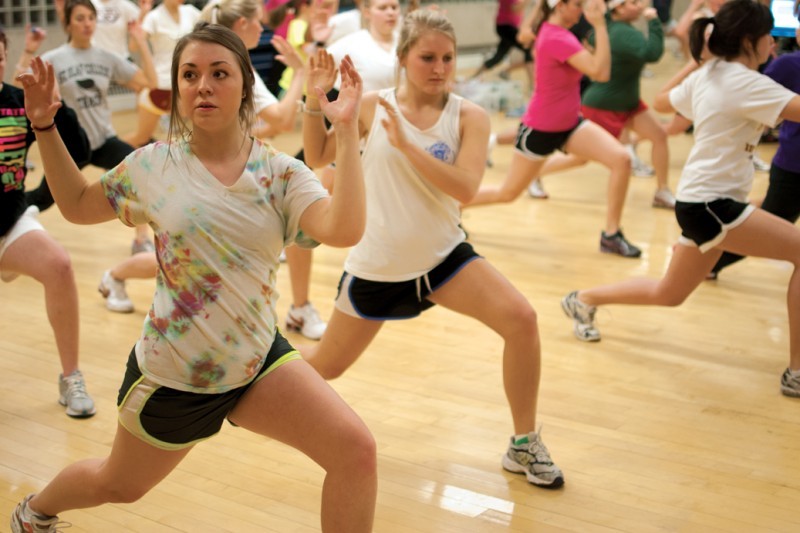Stoffa: Healthy leads to wealthy
File Photo: David Derong/Iowa State Daily
Students warmup on Jan. 18, 2011 before one of the many workout classes offered at Lied Recreation Center.
August 31, 2011
Remember back in elementary school when part of your daily routine was gym class? Even in high school, most students had to take part in physical education for a small portion of their day.
As adults, we have to make an effort to set aside time in the day to exercise. Be it because we are lazy, have work or are too wrapped up in our other extracurricular activities, finding time to get in a few hours of exercise can be a chore. Despite the fact most Americans could do with a couple hours of sweaty exercise a day, face it folks: This is a country full of out-of-shape and overweight people.
But in what I can only see as a genius move by some state agencies in Kentucky, time in the day to exercise that doesn’t “take away” from your “precious” time has come: Paid exercise breaks have been instigated.
Now, there are some rules for these breaks to attempt to prevent some folks from abusing the system. These could include logging in and out at work, having receipts or proof from where you exercise to return to your employer and other precautions.
Though the actual amount of time allowed to work out varies from place to place — the Kentucky Department of Military Affairs allows up to an hour a day, or five hours a week, for employees to remain fit — the idea of being paid to exercise is a sound one.
Crystal Pryor, Personnel Cabinet spokeswoman, said the breaks were cost effective in that they “reduced absenteeism, increased productivity, higher employee morale and lower health care costs for the Kentucky Employees’ Health Plan, the state’s self-funded insurance program.”
A Harvard University study published in 2010 found that “medical costs fall about $3.27 for every dollar spent on wellness programs, and absentee day costs fall by about $2.73 for every dollar spent,” Pryor said, according to an article from Fox News.
If exercise breaks really prove to be cost effective, then making them a feature of nearly every business around this fair country seems like a no-brainer.
And think of how much happier each and every one of you out there in the working world would be if you could log out for a little more than an hour of your work day to improve your health — ideally, 30 to 45 minutes for actual exercise, 10 minutes for a shower, and another 20 to 30 for drive time, depending on the availability of fitness centers.
Yes, this would likely result in a longer work day by a small increment, but you are being paid during these wellness breaks, though I anticipate not as well as your normal pay averages out to.
Breaks to work out cannot legally become mandatory — unless there is some crazy reassignment of judges making decisions because some group creates a campaign to remove judges that actually understand the law, but that would never happen … oh wait, it already has — so the logical way to get this benefit added will be for you fine folks out there to bring programs, such as the ones in Kentucky, to the attention of your employers.
And if you are a bit squeamish about confronting your higher-ups with the notion to pay you to hit the gym, try sending an email or calling your congressman and other government representatives to begin initiatives to make business owners across the nation aware of how beneficial these programs could be.
The obesity levels in this country for both children and adults will not be solved by making McDonald’s food “more healthy,” or by making cereal and other food companies change their product to reflect a balanced diet so as to allow advertising — seriously, Michelle Obama, leave the companies alone and focus your attention on the ill-informed parents.
The obesity levels in this country will be curbed by getting people to exercise more and not gorge themselves on food with grease dripping off it.
Luckily, those greasy, fatty foods tend to begin to taste less yummy the more in shape you find yourself; when you are in shape and eating “right,” the occasional urge to down a burger and fries with all the fatty trimmings will usually be suppressed by your own stomach telling you it will reject such heart attacks on a bun.
It might be a bit questionable that people are so far removed from enjoying exercise that they require financial incentives, but from a business point of view, anything that is fiscally sound and legal is well worth considering.

















